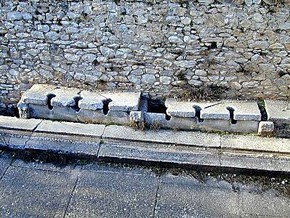
In Philippians 3:8, the apostle Paul compares his religious credentials to knowing Jesus. The difference could hardly be more emphatic: “knowing Christ Jesus my Lord” is of “surpassing value,” but Paul’s past success is like σκύβαλα (skubala). σκύβαλα is commonly translated as rubbish, refuse, or garbage, but sometimes more strongly as dung, in both ancient and modern translations (Vulgate, Tyndale, KJV, NET). Some have suggested another four-letter translation, stronger than dung.
- Medical texts: Aretaeus the Cappadocian (1st century AD), Soranus (1st/2nd century AD), Galen (2nd century AD) and others: When describing disease symptoms, ancient doctors sometimes mention the condition of a patient’s feces (σκύβαλα). For example, Aretaeus says that jaundice is often accompanied by σκύβαλα that is “white and clayey.” (De caus. 1.15.2, 2.9; De cur. 2.5.4; De comp. 13.4; De rem.14.1; De aff. 19.2; similarly Artemidorus the Diviner, Onir. 1.67.11, 2.14.37)
- Strabo, a geographer (1st century AD): Smyrna’s streets lack proper drainage, so that when it rains, “the filth (σκύβαλα) lies on the surface of the streets.” (Geog.14.1.38)
- Josephus, a historian (1st century AD): At the siege of Jerusalem, starvation was so severe that some people went to “search the common sewers and old dunghills of cattle, and to eat the dung (σκύβαλα).” (Wars 5.571)
- Plutarch, a philosopher (1st century AD): Priests avoid touching “excrement (σκύβαλα) and things left over from food” because such things “are neither pure nor clean.” (De Iside. 4). The lees (dead yeast and other particles) should be filtered out of wine, since it is essentially the refuse (σκύβαλα) of wine (Quaes. Conv. 6.7).
- Philo, a Jewish philosopher (1st century AD): just as wheat is sifted to remove the chaff, so people must abandon the moral qualities that “are not divine, which we must leave like refuse (σκύβαλα)” (De Sacr. 1. 109). In typical Philo fashion, he suggests that the ark is an allegory for the human body, and that the door in the ark was for the purpose of expelling excrement (σκύβαλα). (Q. Gen. 2:6)
- Ben Sirach, a Jewish sage (2nd century BC): “In the shaking of a sieve, the husks surface; thus also does the refuse (σκύβαλα) of a man in his speech” (Sir. 27:4)
- Sybilline Oracles (uncertain date): Refugees of war are described as the “refuse (σκύβαλα) of war” (Syb. Or. 7:58, 11:185).
- Greek Anthology (some 1st and 2nd century AD, some uncertain): Four rather light-hearted poems use σκύβαλα to describe inedible material left over from food, such as lobster shell (I.6.89), unripe grapes that have been chewed up and spit out (III.9.375), or fallen table scraps (I.6.302, 303). One poem uses σκύβαλα to describe the “dry sweepings” of trash. Two epitaphs (tombstone inscriptions) use σκύβαλα to describe human remains (II.7.276, II.7.382).
- Church fathers (2nd-4th centuries AD): The church fathers used σκύβαλα dozens of times, but every occurrence seems to be a quotation of or allusion to Paul’s use in Phil 3:8.
- Since σκύβαλα was used in dignified scholarly works by doctors, historians, philosophers and sages, there was nothing objectionable about the word at all. Plutarch’s use of the word in a “high society piece” about proper wine etiquette is strong evidence that this word was not regarded as impolite.
- σκύβαλα can be translated as either dung or trash, depending on the context. The uses of σκύβαλα in the list above demonstrate that σκύβαλα could refer to either dung or to other worthless waste.
- Paul was not alone in using σκύβαλα as a metaphor for something worthless in the moral or religious realm. Philo and Sirach both used σκύβαλα to describe undesirable qualities that should be abandoned. Paul’s interesting, and somewhat different, use of the word is to say that his desirable religious credentials (circumcision, pedigree, Pharisaism, zeal, obedience to the Law) were σκύβαλα – worthless waste – in comparison to knowing Jesus (Phil 3:4-8).
 Biola University
Biola University
.jpg)
.jpg)

